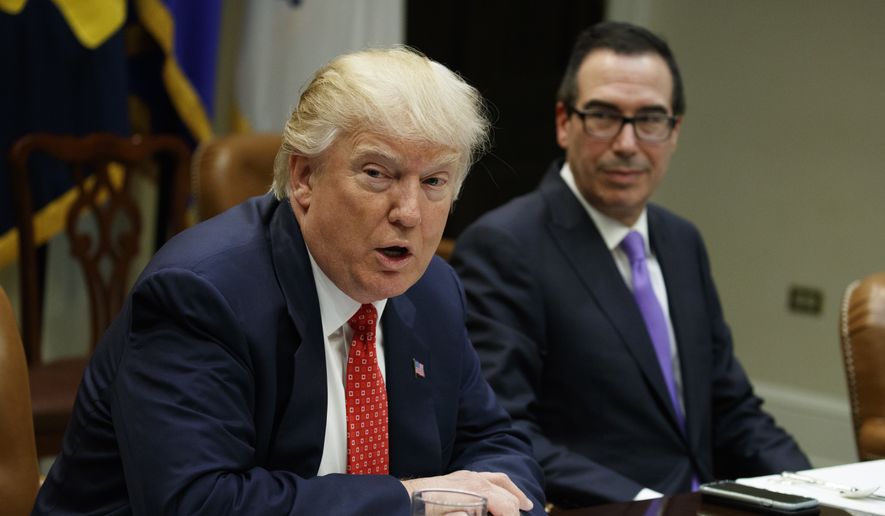Confronting a national debt that nearly doubled under President Obama, President Trump said Wednesday he inherited a federal budget “mess” and vowed to force Washington to stop wasting taxpayers’ money.
“The finances of our country are a mess, but we’re going to clean them up,” the president told reporters. “We won’t let your money be wasted anymore. We must do a lot more with less.”
Preparing for a prime-time address to Congress next week, Mr. Trump met with budget officials and said he will unveil his first proposed budget, a retooled plan to replace Obamacare, and a tax-reform package over the next two months.
The budget framework is expected by mid-March. After one month in office, Mr. Trump said the nation’s fiscal picture isn’t pretty.
“We have enormous work to do as the national debt doubled over the last eight years,” the president said. “I’ve only been here for four weeks, so I can’t take too much of the blame for what’s happened. But it is absolutely out of control.”
Under Mr. Obama, the total national debt rose from $10.6 trillion in 2009 to just shy of $20 trillion last month. Annual budget deficits, which topped $1 trillion during Mr. Obama’s first term, eventually were cut by about two-thirds but started rising again by the end of his presidency to $587 billion.
Mr. Obama’s final budget was about $4.1 trillion. The Congressional Budget Office is forecasting the current fiscal year’s deficit at $559 billion, followed by a slight dip to $487 billion in fiscal 2018 but rising steadily after that to reach $1.4 trillion in 2027.
Trump officials aren’t yet specifying next year’s deficit, with increases expected for the Pentagon and Homeland Security, for example, to hire more border agents and immigration enforcement officers. But the president said that a “moral duty to the taxpayer requires us to make our government leaner and more accountable,” and that likely means some budget cuts on the domestic side.
Among cuts that have been under consideration are conservative targets such as the National Endowment for the Arts and the Corporation for Public Broadcasting, and major reductions for the Energy and Commerce departments. But Mr. Trump also has indicated that he wants to spend more on bigger-ticket items such as infrastructure and transportation.
The White House didn’t specify any spending proposals Wednesday, saying the budget work is far from complete. Office of Management and Budget Director Mick Mulvaney was confirmed by the Senate just last week.
Congressional Republicans are pushing a plan to cut federal spending by $8.6 trillion over the next decade. Trump officials reportedly have considered a budget framework that would slash spending by $10.5 trillion over 10 years.
With some Republican lawmakers under fire from Trump opponents in their districts this week, White House press secretary Sean Spicer said the administration is working on all three agenda items — budget, Obamacare replacement and tax reform — at the same time.
“It’s going to be a very busy March and April for us,” Mr. Spicer said, adding that Obamacare will be addressed before tax reform.
Vice President Mike Pence, at an appearance in St. Louis, Missouri, joked Wednesday about the complicated work of tax reform.
“The tax code is 10 times the size of the Bible, with none of the good news,” Mr. Pence said.
The administration and lawmakers are facing a deadline of April 28 to extend government operations through the end of the current fiscal year. Some budget analysts expect the administration to use that deadline to add emergency spending for beefed-up immigration enforcement and other items on Mr. Trump’s national-security agenda.
“I think that is a highly likely scenario,” said Romina Boccia, a budget specialist at the conservative Heritage Foundation. “Currently there is discussion of a bigger defense supplemental [measure] that would also involve potential some border funding, funding for homeland security, the immigration priorities that the president has laid out. That’s the easiest way of getting around the budget caps. I think it’s fiscally irresponsible, but that’s been the trend and that’s the current discussion.”
Mr. Trump has advocated eliminating spending caps for the military, and he said Wednesday that his administration needs to boost defense spending.
“We have to take care of our military. We have no choice,” the president said. “It needs work. It’s very depleted.”
Even as he embarks on a military buildup, Mr. Trump pledged to reduce wasteful spending.
“We’re going to run government smoothly, efficiently and on behalf of the very hard-working taxpayers — something that the taxpayers haven’t seen in a long time,” he said.
• Dave Boyer can be reached at dboyer@washingtontimes.com.




Please read our comment policy before commenting.